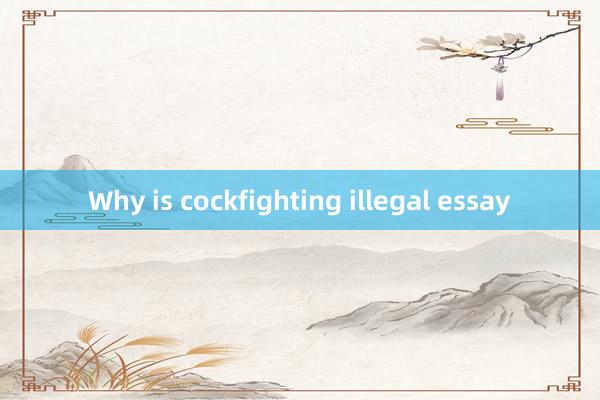Why is cockfighting illegal essay

Why Is Cockfighting Illegal?
Cockfighting, a practice that has been around for centuries, involves placing two roosters in a pit to fight each other, often until one is seriously injured or killed. While it may have historical and cultural significance in certain regions, cockfighting is illegal in many countries, including the United States, due to concerns about animal cruelty, public safety, and organized crime. Understanding the reasons behind its illegality sheds light on the broader issues of animal welfare and societal values.
Animal Cruelty and Ethical Concerns
One of the primary reasons cockfighting is illegal is due to the inherent cruelty involved. Roosters are bred specifically for aggression and often outfitted with sharp blades or metal spurs attached to their legs, making the fights even more brutal. The animals are forced to fight until one or both sustain life-threatening injuries or die from exhaustion, blood loss, or trauma.
Animal rights organizations and ethical groups argue that cockfighting is a clear example of animal abuse. Unlike natural animal behavior, where fights between roosters might occur briefly and without fatal consequences, cockfighting turns aggression into prolonged violence for entertainment. Forcing animals into such situations is viewed as a violation of their basic rights to be treated humanely, and this viewpoint has driven much of the legislation banning the practice.
Legal Precedents and Government Action
In many countries, laws surrounding cockfighting fall under broader animal welfare regulations. For example, in the United States, the Animal Welfare Act (AWA) is one of the key federal statutes used to prosecute those involved in cockfighting. The act prohibits the interstate transportation of animals for fighting purposes, and those caught engaging in the activity can face serious penalties, including fines and imprisonment.
Additionally, individual states have their own laws prohibiting cockfighting, often classifying it as a felony. This legal approach reflects the growing consensus that animal cruelty, in any form, should not be tolerated in a modern society. Governments worldwide have taken similar actions, passing laws that not only make cockfighting illegal but also target those who organize, promote, or attend these events.
Public Health and Safety Concerns
Cockfighting isn't just a problem due to animal cruelty—it also poses risks to public health and safety. Events are often held in secret, unregulated locations, which can become breeding grounds for unsanitary conditions and the spread of disease. Avian diseases, including bird flu, can easily spread through cockfighting because the birds are often kept in close, unsanitary quarters and transported across regions without proper health checks. The potential for such diseases to spread to humans is a serious concern for public health officials.
play go88Sunwin đổi thưởngIn addition to the health risks, cockfighting events are often linked to illegal gambling and other criminal activities. Large sums of money can be bet on the outcome of fights, attracting organized crime syndicates that profit from these events. The underground nature of cockfighting can lead to violence and disputes among participants, posing additional safety risks for those involved or nearby.
Cultural and Historical Context
While cockfighting is widely condemned in many parts of the world, it remains a cultural tradition in certain regions, particularly in parts of Asia, Latin America, and the Caribbean. In these areas, cockfighting is seen as part of the local heritage, often linked to festivals, religious events, or social gatherings. Proponents argue that it is a deeply ingrained practice that reflects their cultural identity and that banning it is an infringement on their traditions.
However, even in places where cockfighting has cultural significance, it has faced increasing scrutiny and legal challenges. Many countries have begun to reconsider the balance between preserving cultural traditions and upholding modern ethical standards. While some argue that cockfighting is no different from other forms of animal competition, like horse racing or dog sledding, critics highlight that the intent behind cockfighting is far more violent and damaging to the animals involved.
Shifting Attitudes and the Future of Cockfighting
Attitudes toward animal rights have evolved significantly over the past few decades. As society places greater emphasis on the humane treatment of animals, activities like cockfighting that involve cruelty for the sake of entertainment are increasingly viewed as unacceptable. The global trend is toward stronger enforcement of animal cruelty laws and a push to eliminate practices that exploit animals for profit or amusement.
Education plays a critical role in shifting these attitudes. Many animal welfare organizations are working to raise awareness about the cruelty involved in cockfighting and to promote alternative forms of entertainment that do not harm animals. As public opinion continues to move in favor of animal rights, it's likely that the remaining areas where cockfighting is still legal will face increased pressure to change their laws.
Conclusion
Cockfighting is illegal in many parts of the world because it violates ethical standards regarding the humane treatment of animals, poses risks to public health, and is often associated with criminal activity. While it may hold cultural significance in some regions, the growing emphasis on animal welfare and public safety has led many countries to ban the practice. As society continues to prioritize ethical treatment of animals, the future of cockfighting looks increasingly uncertain, with further crackdowns likely on the horizon.
jili appswww.mairieaussevielle.com

